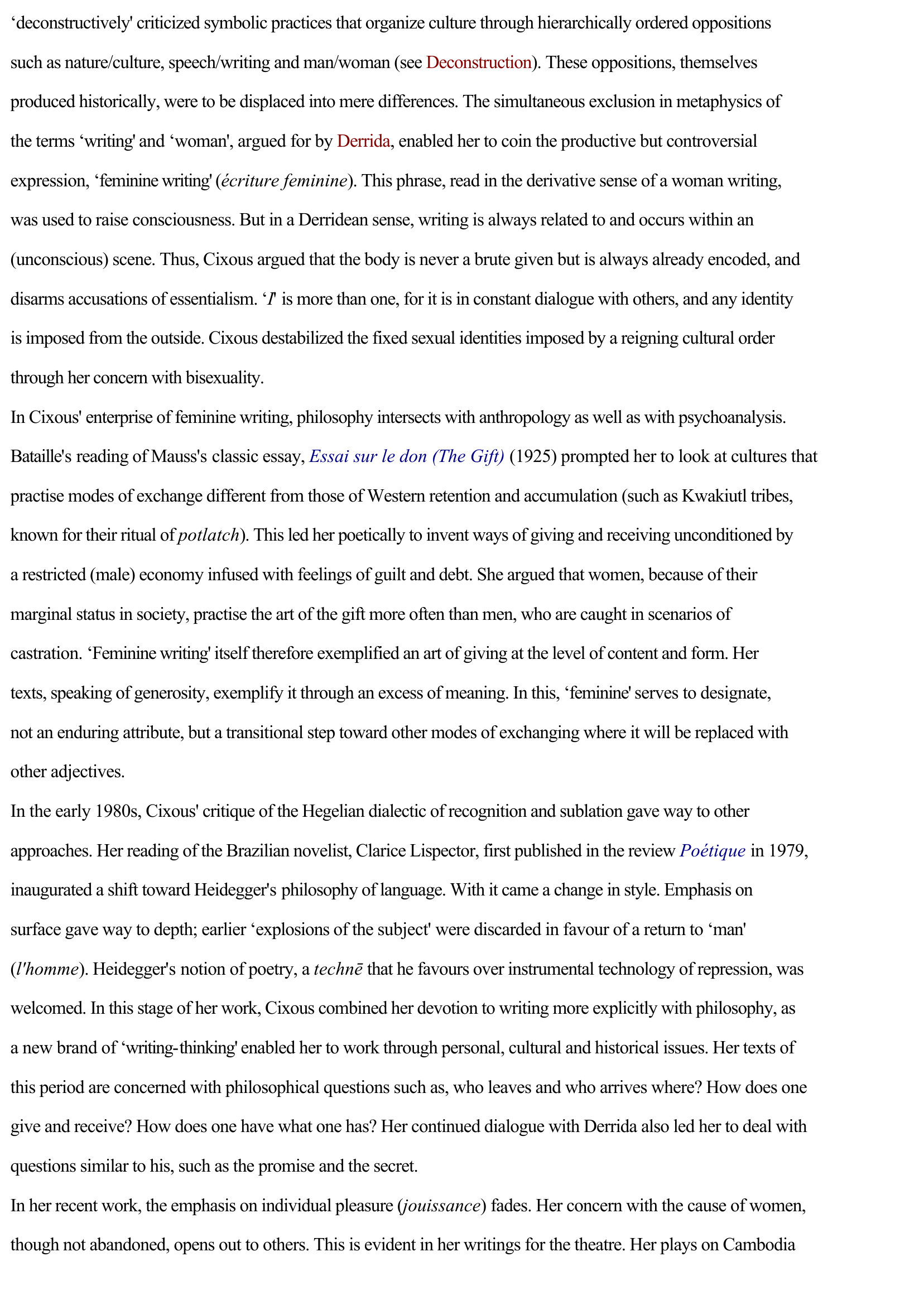Cixous, Hélène
Publié le 22/02/2012

Extrait du document
«
‘deconstructively' criticized symbolic practices that organize culture through hierarchically ordered oppositions
such as nature/culture, speech/writing and man/woman (see Deconstruction ).
These oppositions, themselves
produced historically, were to be displaced into mere differences.
The simultaneous exclusion in metaphysics of
the terms ‘writing' and ‘woman' , argued for by Derrida , enabled her to coin the productive but controversial
expression, ‘feminine writing' (écriture feminine ).
This phrase, read in the derivative sense of a woman writing,
was used to raise consciousness.
But in a Derridean sense, writing is always related to and occurs within an
(unconscious) scene.
Thus, Cixous argued that the body is never a brute given but is always already encoded, and
disarms accusations of essentialism.
‘I' is more than one, for it is in constant dialogue with others, and any identity
is imposed from the outside.
Cixous destabilized the fixed sexual identities imposed by a reigning cultural order
through her concern with bisexuality.
In Cixous' enterprise of feminine writing, philosophy intersects with anthropology as well as with psychoanalysis.
Bataille 's reading of Mauss 's classic essay, Essai sur le don (The Gift) (1925) prompted her to look at cultures that
practise modes of exchange different from those of Western retention and accumulation (such as Kwakiutl tribes,
known for their ritual of potlatch ).
This led her poetically to invent ways of giving and receiving unconditioned by
a restricted (male) economy infused with feelings of guilt and debt.
She argued that women, because of their
marginal status in society, practise the art of the gift more often than men, who are caught in scenarios of
castration.
‘Feminine writing' itself therefore exemplified an art of giving at the level of content and form.
Her
texts, speaking of generosity, exemplify it through an excess of meaning.
In this, ‘feminine' serves to designate,
not an enduring attribute, but a transitional step toward other modes of exchanging where it will be replaced with
other adjectives.
In the early 1980s, Cixous' critique of the Hegelian dialectic of recognition and sublation gave way to other
approaches.
Her reading of the Brazilian novelist, Clarice Lispector, first published in the review Poétique in 1979,
inaugurated a shift toward Heidegger 's philosophy of language.
With it came a change in style.
Emphasis on
surface gave way to depth; earlier ‘explosions of the subject' were discarded in favour of a return to ‘man'
(l'homme ).
Heidegger 's notion of poetry, a technē that he favours over instrumental technology of repression, was
welcomed.
In this stage of her work, Cixous combined her devotion to writing more explicitly with philosophy, as
a new brand of ‘writing -thinking' enabled her to work through personal, cultural and historical issues.
Her texts of
this period are concerned with philosophical questions such as, who leaves and who arrives where? How does one
give and receive? How does one have what one has? Her continued dialogue with Derrida also led her to deal with
questions similar to his, such as the promise and the secret.
In her recent work, the emphasis on individual pleasure ( jouissance ) fades.
Her concern with the cause of women,
though not abandoned, opens out to others.
This is evident in her writings for the theatre.
Her plays on Cambodia.
»
↓↓↓ APERÇU DU DOCUMENT ↓↓↓
Liens utiles
- DEDANS Hélène Cixous (résumé & analyse)
- Cixous, Hélène.
- Cixous, Hélène - écrivain.
- CIXOUS Hélène : sa vie et son oeuvre
- En quoi la littérature et le cinéma participent-ils à la construction de la mémoire de la Shoah ? (exemple du journal d'Hélène Berr)

































